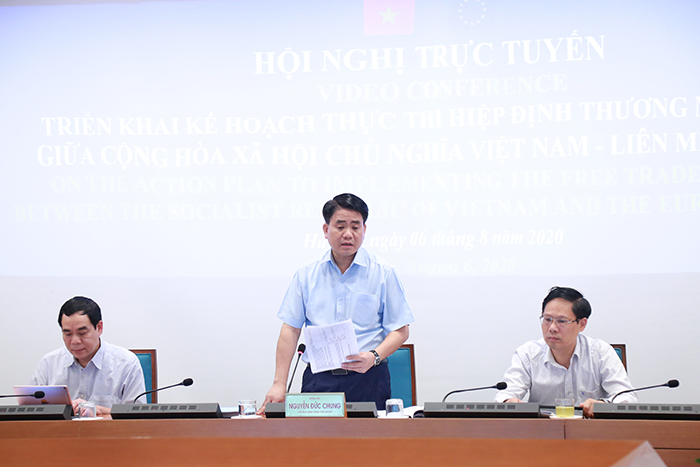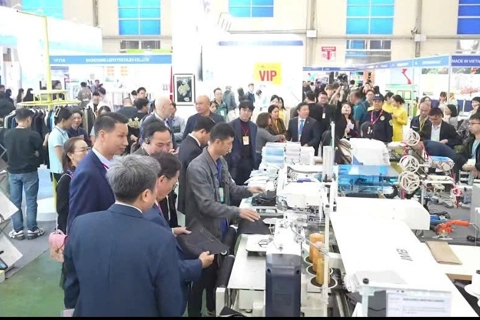Hanoi to call for EU investment in pharmaceutical and hi-tech industries: Mayor
The EVFTA is an opportunity for Hanoi to boost cooperation in trade and investment with EU member countries, said Hanoi’s mayor Nguyen Duc Chung.
As the EU – Vietnam Free Trade Agreement (EVFTA) has come into force, Hanoi plans to promote investment from European countries, focusing on pharmaceutical, supporting and hi-tech industries, according to Chairman of the municipal People’s Committee Nguyen Duc Chung.
| Chairman of the Hanoi People's Committee Nguyen Duc Chung speaks at the online conference. Photo: Hanoi government portal. |
The trade deal is an opportunity for Hanoi to boost cooperation in trade and investment with EU member countries, Mr. Chung said at an online conference regarding the implementation of the EVFTA on August 6.
According to Mr. Chung, 23 out of 27 EU countries are investing in Hanoi with registered capital of a combined US$4.16 billion, or 10% of total foreign direct investment (FDI) in the city to date.
The majority of European businesses in Hanoi are operating in the supporting industries and manufacture of hi-tech products, Mr. Chung informed.
In the anticipation of the EVFTA, Mr. Chung said Hanoi has drafted an action plan for comprehensive investment and cooperation programs between Hanoi and EU countries, especially those with a long-standing relations with the capital city.
To continue attracting FDI from EU, Hanoi would focus on reforming administrative procedures and the business environment, Mr. Chung suggested.
Mr. Chung noted one of the city’s priorities is to support local small and medium enterprises (SMEs) in taking part in technology transfer, acquiring new technologies and joining the Industry 4.0 for higher quality of products and services.
While the tourism industry has been severely affected by the pandemic, Hanoi identifies the EU as a major market and would continue to attract European tourists in the post-Covid-19 period, Mr. Chung added.
Over the past two years, while the rate of goods and products from foreign-invested enterprises exported to the EU market has gone down from 55% to 46%, that of Hanoi’s firms has increased from 46% to 54.5%. This suggested enterprises in Hanoi have been investing in technologies and renovating their production methods to adapt to requirements of EU market, Mr. Chung asserted.
Hanoi’s authorities would continue to support local enterprises in enhancing competitiveness to meet the EU’s strict requirements, Mr. Chung stated.
The EVFTA took effect on August 1 following the green light from the European Parliament on February 12 and a similar decision from Vietnam’s National Assembly on June 8.
The EVFTA, officially signed last June after six years of negotiations, has been dubbed the most ambitious FTA the EU has ever reached with a developing country, according to the European Commission. It not only includes the almost full elimination of bilateral tariffs, but also a substantial reduction of non-tariff barriers. Moreover, it includes provisions to protect intellectual property, labor, environmental standards, and fair competition, while promoting regulatory coherence.












